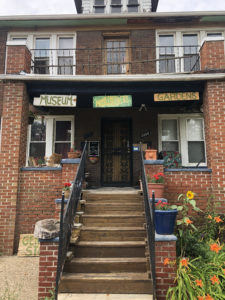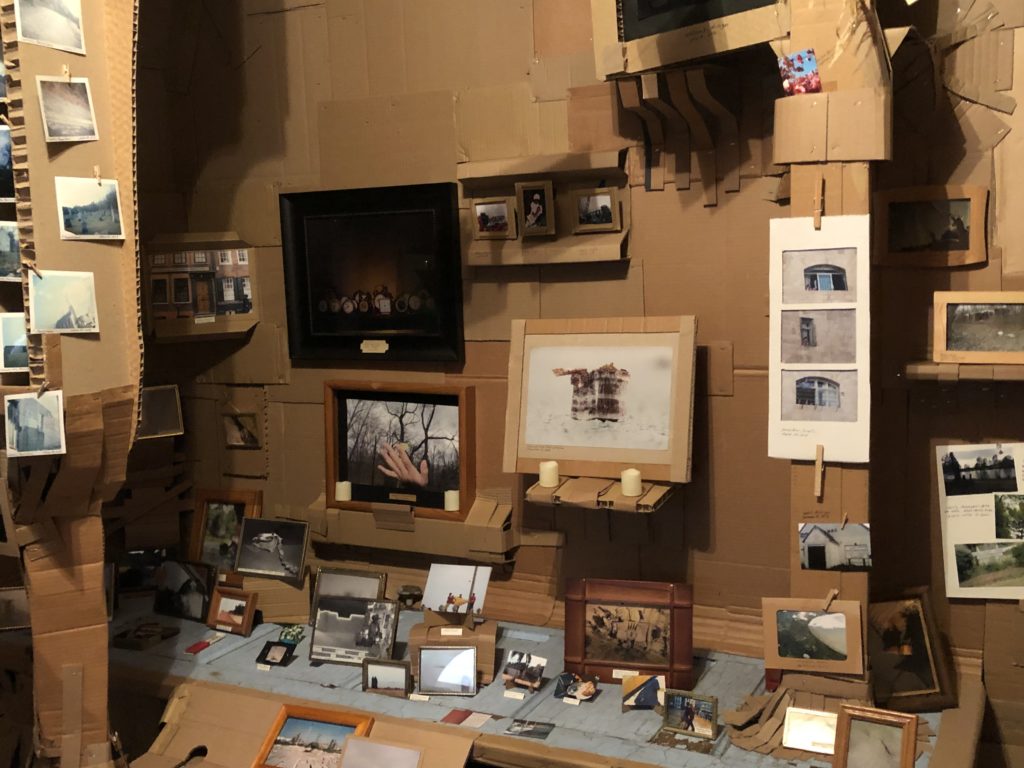One perk of creative writing is that over time, if you’re lucky, you gather a far-flung, richly varied group of friends.
Many years ago, for example, I met Stefany Ann Golberg (better known as Shuffy) and Morgan Meis, a married couple who write, teach, and travel widely: Sri Lanka, Bulgaria, Honduras, LA, Italy, India, South Tyrol.
Morgan, an art theorist and critic, is working on the third of a trilogy of books, each centered upon a single painting.
Shuffy, also a multimedia artist and filmmaker, has published two books of creative nonfiction.
Co-founders of NYC’s Flux Factory, the well-known arts collective, the pair chucked city life a decade ago to dwell for a time in what they described as a bunker in Schwenksville, Pennsylvania. In 2017 they moved to Detroit and bought a four-plex in an advanced state of disrepair.
“We’re still trying to get the living room where we can sit in it,” Shuffy reported earlier this year.
I was lucky enough to spend a week with them recently and, as I suspected, in fact they have spent the last seven years clearing, sanding, refinishing, and designing a house that is really a DIY work of art.
There’s a big, open, light-filled kitchen, a dressing room, a meditation room, and a “mezzanine” loft for cozy winter conversations. To host guests — an important element in their ethos — they’ve set up a separate wing with its own bedroom and bath.
But they’ve constructed much more than a house. Shuffy has been collecting small objects — pebbles, ticket stubs, birds’ eggs — for decades. She’s also been writing text: short reflections, echoes, prose poems. She’s been taking photos and, lately, gathering sounds.
At some point she received a message of sorts: This isn’t just for you.
The house, located in a downtown-adjacent neighborhood called Core City, happened to be zoned for both residential and commercial use. So, as the upstairs living quarters took shape, Shuffy also began realizing a lifelong dream: The Huckleberry Explorers Club (HEC).

The HEC comprises a general store, a museum, and gardens. The general store sells such items as Kodachrome U.S. travel booklets, boxes of rock sugar, a miniature watercolor set, vintage clothing, and books. An armchair-furnished sitting area offers free coffee, tea, soda, and candy.
The museum — a separate, dimly lit room — is a kind of literary sacred cave. For the structure (Morgan’s creation), think Gaudi’s Sagrada Familia in miniature, fashioned from cardboard.
Each item — arranged in frames, boxes, and niches — has a little tag affixed bearing a short description, place, and/or date. A string of dime-store purple beads: “Dave’s Market Parking Lot, Cleveland, Ohio, July 2, 2015.” An origami grasshopper: “Gift from Filip ven der Bergh, Antwerp, Belgium.” A rack of “Keys from Doors I No Longer Remember.”
A scrapbook holds a seemingly random collection of Shuffy’s musings. If you peruse these small objects, photos, keepsakes, and writings slowly and carefully, they offer a glimpse into the story of a life.
Then there’s the backyard garden. Bordered by catalpa, locust, and huge old-growth mulberry trees, this public green space is open 24/7 to whoever might happen by.
A pollinator garden bursts with cone flowers, yarrow, pokeweed, dock, and black-eyed Susans. Kale, garlic, onions, tomatoes, squash, corn, watermelon, and herbs overflow from vegetable beds. More than 40 newly planted trees include redbud, cherry, and Japanese maple. And let’s not forget the eight or 10 different kinds of berries.
Morgan has built lopsided arches and overhead trellises from scrap lumber he finds on the street. A friend with a backhoe recently dug a giant hole in the backyard that’s earmarked for a pond.
“A lot of it is aspirational,” says Shuffy. “We hope to add a wooded grove and a bird sanctuary.”
The Club opened on Jan. 1, 2020, suffered spotty operation for a couple of years due to COVID-19, then resurrected and now opens its doors three days a week.
The hours are seasonal, but generally run along the lines of Saturday, 2-4 p.m., Sundays, 3:30-6 p.m., and Mondays, 4-7 p.m. After-hours gatherings include a micro-cinema, a book club, impromptu art talks, and the recent Strawberry Fest.
Shuffy’s vision was that people would come in and have a kind of poetic experience. Instead, it turns out, much of the time visitors simply want to talk to her and Morgan.
“In a way,” she says, “the thrust is religious without being about organized religion. It fulfills our desire and need to get together at certain times and share ritual. There is a structure to it, with the different activities and rooms. In summer especially, the garden is a focal point. The people who come seem to appreciate the structure.”
The entire Club is a freewill offering, not promoted on social media and with zero online presence. Neither Shuffy nor Morgan have cellphones. Local people simply stop by and for the rest, email suffices.
Having been their guest for a week, I can vouch for the overflowing generosity of spirit that pervades this wondrous, mysterious adventure.
As Father Luigi Giussani observed, “Other people are to be hosted within ourselves. Hospitality is making another person part of our own living. Bear in mind that hospitality is the greatest possible sacrifice after living one’s life.”

